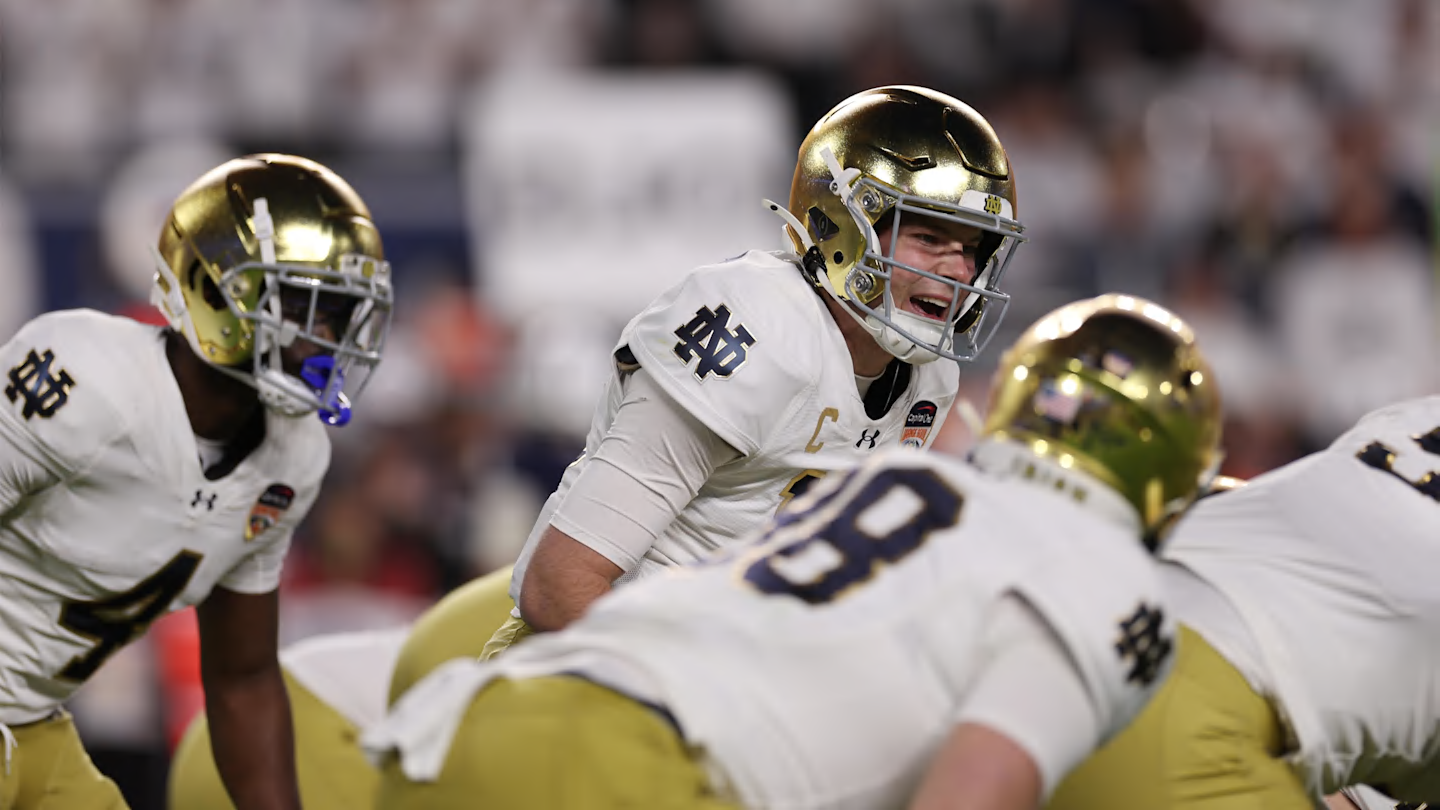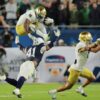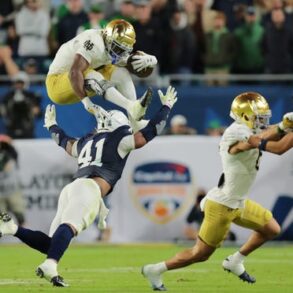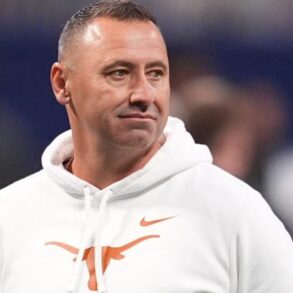
Notre Dame’s thrilling win over Penn State in the Orange Bowl came on the leg of kicker Mitch Jeter, who split the uprights as time expired to give the Fighting Irish a 27–24 victory.
But in the plays leading up to Jeter’s kick, there were some questions, and some questionable suggested answers, regarding Notre Dame’s clock management.
With 28 seconds left to play and the game tied 24–24, Notre Dame had the ball at the Penn State 37-yard line. The Irish had two timeouts to play with, and given the rushing ability of quarterback Riley Leonard, it felt like the most likely course of action over the next few plays was to run the ball for better field position and kick for a potential win.
Analyst Greg McElroy, who was calling the game, had other ideas.
“One thing Marcus Freeman can acknowledge here is, ‘Hey, we don’t want to score too quick here,’” McElroy said over the broadcast. His partner, play-by-play man Sean McDonough, suggested that Notre Dame was likely playing for a field goal, but McElroy powered on.
“Remind your guys, no need to score a touchdown,” McElroy said. “You need to kneel on it at the three-yard line, we take a couple more knees, no problem. Do not find the end zone here to give Penn State a chance to go down and potentially tie it with their own touchdown.”
Greg McElroy was adamant that, with 28 seconds left, Notre Dame should avoid scoring a touchdown at all costs. pic.twitter.com/bFaVrgBca8
— Awful Announcing (@awfulannouncing) January 10, 2025
There’s a good amount to unpack here. First and foremost, the Irish had already pretty clearly indicated by their play selection that they were playing for a field goal, so the whole hypothetical seemed mostly unnecessary. But if the scenario McElroy imagined did play out, it would be a pretty big mistake for whichever Notre Dame player broke free to kneel down just short of the goal line.
The mantra of “don’t score too quickly” has become common sense across the football landscape due to a variety of factors—touchbacks have been moved up, rules give advantage to the offense, Patrick Mahomes continues to exist—but at the college level, taking a touchdown lead with roughly 20 seconds to play still feels pretty good, especially when you consider that Jeter had hit on just 65% of his kicks on the season.
While protecting the ball and playing for a field goal to win the game is one thing, deciding to actively decide against taking a touchdown lead and instead putting the game on the foot of a kicker who has missed seven field goals on the year—including one from inside 30 yards—as McElroy suggested, is another call entirely.
Fans following the action at home were befuddled by McElroy’s suggestion.
That was the strangest piece of announcing by an announcer in a big time game I’ve ever heard in my life.
— Gideon Townsend (@GideonTownsend) January 10, 2025
Couldn’t believe it: choose between free and clear touchdown and 6 pts w less than 30 secs in game or hope for field goal and 3 pts and run out clock. Im thinkin touchdown
— Kurt Phillips (@KurtPhillips17) January 10, 2025
We’ve gotten to a point where we “overthink” football. This was baffling to me. If PSU gets the ball with 25 seconds left and no timeouts and scores a TD, that’s a failure of your defense. https://t.co/Yef5699bRM
— Michael Day (@MichaelDayDMD) January 10, 2025
some of the worst analysis I’ve ever heard from McElroy
at some point you’re just trying to come up with stuff to fill the silence, I assume https://t.co/9Rg1NB7dJT
— ACC Enthusiast Joey (@joeyweaver on bluesky) (@FTRSJoey) January 10, 2025
I couldn’t believe he was saying this https://t.co/WF1niWWizv
— Cody Helderman (@stlcardsfanchip) January 10, 2025
It feels like McElroy simply backed himself into a galaxy brain take here. In his defense, there are indeed times when “don’t score too quickly” is a must-follow mantra. Over the past few years there has been a huge rise in interest in situational football and clock management decisions, and the best color commentators in the game—looking at you Greg Olsen—break down these situations for audiences at home in precise terms.
Indeed, just two weeks ago, Bengals coach Zac Taylor came under criticism when his team scored to take a touchdown lead over the Denver Broncos with 90 seconds still to play, when they could have knelt for a field goal and left Denver with far less time to drive the field.
Had there been 90 seconds left to play, rather than 28, and had this been the NFL rather than college, McElroy’s comments could have been viewed as incisive, or at the very least would not have garnered the attention they did. But instead, it feels as though McElroy misread the situation in a split second decision, and his job means those misreads are broadcast over ESPN airwaves.
This post was originally published on this site be sure to check out more of their content.






